Alumni Spotlight: Dr. Adele Harrison
.jpg)
Dr. Adele Harrison hails from the small town of Eastman, Georgia, where her early experiences as a collegiate softball player at the University of Georgia sparked a lasting passion for sports and healthcare. After graduating in 2015, she gained valuable hands-on experience working as a medical assistant and scribe in orthopedic surgery and family medicine, which helped clarify her dedication to becoming a physician. Choosing Trinity School of Medicine for its flexible start dates and supportive community, Dr. Harrison excelled both academically and in leadership roles, including serving as President of the Student Government Association. In 2025, she proudly matched into Emergency Medicine at Wellstar Kennestone, near home, embracing the fast-paced, varied nature of the specialty. Throughout her journey, Dr. Harrison’s commitment to patient advocacy and her gratitude for Trinity’s encouragement have remained at the core of her success.
Where are you from? I grew up in Eastman, Georgia, a small town located just south of Macon and not far from Warner Robins, where we have the option to complete all of our clinical rotations.
What's your academic background? I attended the University of Georgia for my undergraduate studies, where I also played softball, and graduated in 2015.
What brought you into medicine? Growing up, softball was a major part of my life, even into college, where I played at the University of Georgia. That experience shaped much of who I am and laid the foundation for my interest in sports and, eventually, medicine. From an early age, I was drawn to healthcare. Watching the impact physicians had in my small hometown made a lasting impression on me; they were true pillars of the community, and I knew I wanted to serve in that kind of role, someone who advocates for and supports patients.
After graduating from UGA in 2015, I spent three and a half years working as a medical assistant and scribe in orthopedic surgery and sports medicine, followed by a year in family medicine. Those experiences exposed me to a wide range of clinical settings and healthcare professionals, giving me a broader view of medicine as a whole. It helped solidify my decision to pursue a career as a physician, even though I hadn’t yet decided on a specialty.
It was during the COVID-19 pandemic in 2020 that I made the final decision to apply to medical school. I began my medical education in January 2021 at Trinity School of Medicine.
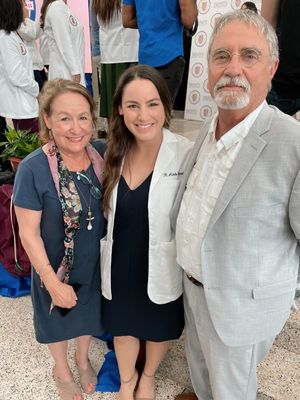
Why did you choose Trinity, and what ultimately helped you make the decision? I considered applying to U.S. medical schools, but since I made the decision to pursue medicine mid-year, I would have had to wait an additional year to start—and I didn’t want to lose that time. Trinity’s three enrollment periods—January, May, and September—made it possible for me to begin sooner, which was a major factor in my decision.
Before applying, I connected with several students who were already attending Trinity. Many were either on their way to residency or already matched, and hearing their experiences gave me confidence that this path could work. I also had the support of Terry Coleman, a former Georgia state representative, who helped me learn more about the school.
The encouragement and success stories from others reassured me that with hard work and dedication, becoming a doctor through Trinity was absolutely achievable.
How well do you feel that Trinity prepared you for the Match? I felt incredibly well-prepared, both during the residency application process and throughout my interviews. My clinical experience up to that point gave me a strong foundation, and I truly believe Trinity does a great job preparing students, not just clinically but also during the basic sciences. If you’re willing to put in the work, you’ll be successful.
I didn’t face any issues when applying and was able to apply wherever I wanted. Trinity absolutely prepared me for residency, and even now, as I’m going through it, I continue to feel confident and well-equipped.
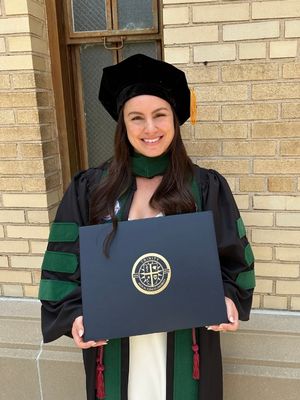
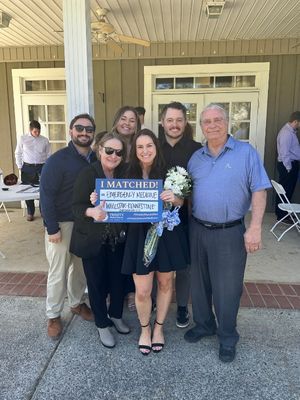
Where did you match? I graduated from Trinity in May 2025, and I matched into Emergency Medicine at Wellstar Kennestone, Georgia, and I couldn’t be happier. I love being close to Trinity and, more importantly, close to home. When applying to residencies, I focused on programs in the Southeast, especially in Georgia, and I was fortunate to match at my top choice. Location was a major priority for me because staying near family has always been important.
What is a typical day like as an Emergency Medicine resident? What I love most about emergency medicine is that every day is different. I never know what I’ll walk into, and that unpredictability keeps me engaged and challenged. It’s fast-paced, hands-on, and constantly evolving. One of the reasons I chose emergency medicine is that it allows me to care for patients of all ages and address a wide range of conditions across every organ system. I’m not limited to any one area, and that variety really suits me.
I also thrive in the unknown, and being there for patients during some of the most difficult and critical moments of their lives is something I deeply value. It’s a privilege I never take for granted.
The shift work is another aspect I appreciate; it gives me the work-life balance I need. Medicine demands a lot, so having clearly defined time away from the hospital helps me recharge and maintain a healthy perspective.
Ironically, I never imagined going into emergency medicine. I had actually ruled it out early in med school. But once I experienced it firsthand, I realized it was the perfect fit. Now, I can’t imagine doing anything else.
Was Trinity a good choice for you? Trinity was the right choice for me—truly the only choice. I’ve always believed that if there’s a will, there’s a way. If you can’t see yourself doing anything other than practicing medicine, then it’s absolutely worth pursuing. That’s exactly how I felt. I knew I wouldn’t have been fulfilled doing anything else, and now that I’m here, I’m incredibly grateful to Trinity for giving me that opportunity.
Without Trinity, I wouldn’t be where I am today. Even on the hardest days of residency, those long, exhausting shifts, I still feel deeply thankful. I finally get to be the patient advocate I always aspired to be. Trinity helped me make that dream a reality, and for that, I’ll always be grateful.
For anyone who’s unsure or questioning if this path is possible, I would say: there’s no better time than now. Trinity gives you the chance to go after your goals without delay. I remember being in that same place—unsure, wondering if I could really do this, but once I committed and found a school that believed in me, everything changed. The support I received made all the difference, and it showed me that with the right foundation, you really can become who you’re meant to be.
Residency has its challenges; it’s a steep learning curve, but when you truly can’t imagine yourself doing anything else, every moment is worth it.
Did you feel supported throughout your education at Trinity? Absolutely, and I truly appreciate everyone at Trinity. I still stay in touch with many people from the school. During my first week of residency, Dr. Kelly, the Dean of Clinical Sciences and Curriculum, even texted me to check in and see how I was doing. That meant a lot. The deans genuinely care about the students and want to see us succeed. I’ve met with Dr. Kelly countless times just to talk, and she’s always been approachable, supportive, and available whenever I needed her.
What responsibilities did you have as SGA President? It was an incredibly rewarding experience. I had the opportunity to act as a liaison between the student body and the administration during a key period of transition, including a change in deans. That leadership role gave me valuable experience, and I was able to speak about it during my residency interviews.
As SGA president, I also contributed to Trinity’s CAAM-HP accreditation process and conducted research focused on student feedback. I surveyed the student body about various aspects of their experience, what they appreciated about the classes, the level of support they felt, which courses and rotations were most impactful, and used that data to help improve overall student satisfaction. I worked closely with Dr. Geisler and Dr. Kelly throughout that process, and it was a great opportunity to contribute meaningfully to the school community.
Were you active in any other school organizations? In addition to serving as SGA president, I also held the role of term representative and became a mentor for underclassmen. Since developing my leadership skills was a priority for me, I intentionally got involved in organizations and clubs that would help me grow in that area.
As Student Government President, I was involved in the mentorship program, where clinical students are paired with Term 5 students who share similar specialties or interests. The goal is to guide them through their upcoming rotations and the residency application process. It’s a valuable experience—not only for the mentees, but also for us as mentors, as it mirrors the teaching and leadership responsibilities expected of us in residency.
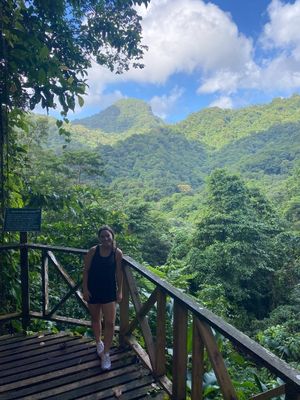
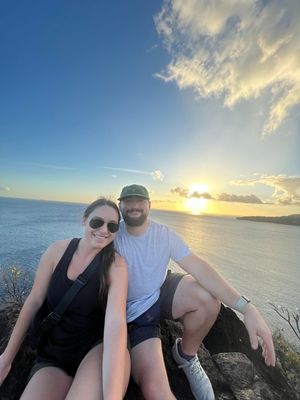
What was the transition like from where you moved from, compared to living on the island and studying abroad? The transition to the island was incredibly smooth for me. I had a lot of support early on—people shared packing lists and helped me know what to expect before the move. My parents came with me, and we made it a fun trip by taking a catamaran around the islands for a few days before the White Coat Ceremony. The island itself is beautiful and full of life. I had such a great time while I was there and made some of my closest friends during that period. It was truly an unforgettable experience.
The professors were amazing, supportive, and fully invested in our success. They consistently went above and beyond to make sure we understood the material and felt confident in our journey. I still think about how they were there for me during challenging moments. The deans were equally incredible, approachable, and genuinely dedicated to the students' growth.
The island offered a great balance. During breaks, you could relax at a five-star resort or explore the local culture, which was refreshing and eye-opening for someone like me who came from a small town. It really expanded my perspective and gave me a chance to experience something completely new.
When it came time to return to Georgia, that transition was just as smooth. I already had an apartment in the area and was able to complete my clinical rotations in a familiar environment, which made everything easier. Trinity did a fantastic job making the process seamless, from the moment you land on the island, where the welcome committee greets you at the airport, to the support from people like Mr. Keith Hollers, the Vice President of Student Services at the time.
There was also a welcome committee and orientation for Term 5 students once we got back to Georgia, which made settling in even easier. Overall, Trinity’s support system was strong every step of the way, and that made a huge difference.
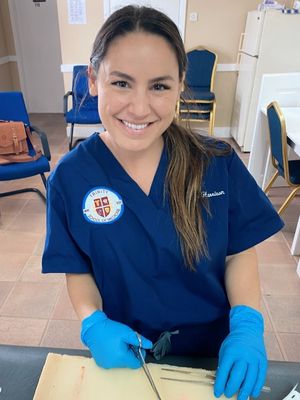
Do you have any stand-out memories, stories, or experiences regarding your time at Trinity? The friendships I made on the island will always be incredibly meaningful to me. There’s something really special about experiencing such a major life change, starting medical school in a new country and culture, alongside people who are going through the same thing. I didn’t expect to form such strong bonds, but it ended up being one of my favorite parts of the island experience.
That sense of camaraderie made all the difference. We played soccer during the week, went out to dinner on the weekends, studied together in our rooms, and supported each other through the ups and downs. Having that close-knit group while navigating something so unfamiliar was invaluable. It became a big part of my med school journey.
I also had the chance to meet people from all over the world. Despite our different backgrounds, we were all working toward the same goal, and that brought us together in a really powerful way. The friendships you form in medical school truly are lifelong, and I’m so thankful for the people who helped me through that chapter.
What is the best advice you could share with a prospective Trinity student? If you can’t see yourself doing anything else, then medicine is absolutely the path for you. It’s challenging, there’s no doubt about that, but it’s also one of the most rewarding careers and callings out there. There’s truly nothing like it. If you’re on the fence but know you’d regret not pursuing it, that’s reason enough to go for it.
Now that I’m on the other side, working in residency and treating patients every day, I can honestly say it’s worth every bit of the effort and sacrifice. There’s something incredibly fulfilling about being in the emergency department, helping people in some of their most vulnerable moments, and bridging the gap between patients and the care they need.
We need more passionate, dedicated doctors, and I want to encourage anyone who’s considering medicine to take that leap. It’s not an easy road, but it’s 100% worth it.
If you’re interested in learning how Trinity can support your dream of becoming a doctor, we invite you to reach out to our admissions team today! Contact us here.




